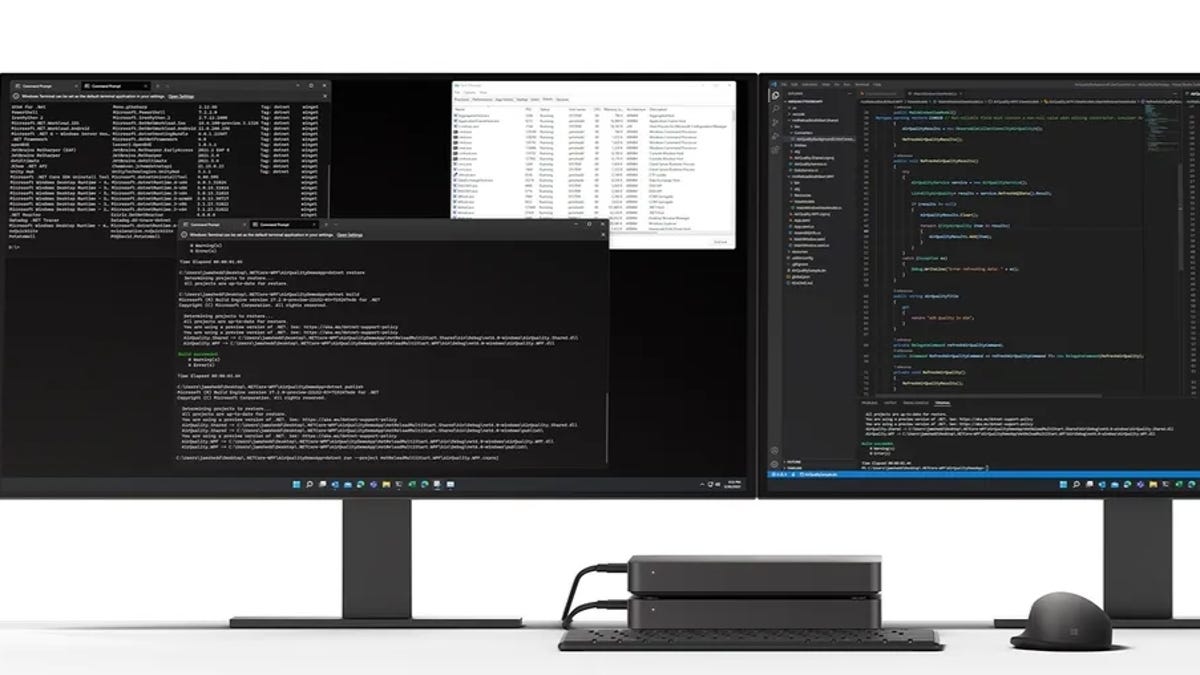'Project Volterra': Microsoft is building an Arm dev kit on the Snapdragon compute platform

Microsoft is working on a new Windows-on-Arm dev kit powered by Qualcomm’s Snapdragon compute platform that will allow Windows developers to build Arm-native apps. Codenamed “Project Volterra,” the dev kit, coming sometime later this year, will allow developers to use coming Arm-native versions of Microsoft dev tools to build apps — especially apps that handle AI processing on the device.
Microsoft announced Volterra on Day 1 of its virtual Build 2022 developers conference on May 24, hoping to generate more excitement around its Windows on Arm (WoA) platform. Microsoft has been working on Windows on Arm for years, but there are still few (if any) compelling PCs and devices running on it. Qualcomm isn’t expected to field a respectable WoA processor for PCs until the second half of 2023.
Microsoft officials talked about Volterra in the context of “intelligent hybrid compute” — the idea that local compute on devices will make use of local CPUs, GPUs and Neural Processing Units (NPUs) in conjunction with Azure for cloud compute. Officials said they ultimately expect to see NPUs built into “most, if not all, future computing devices.” Earlier this year, Microsoft showed off a number of AI-powered features coming to Windows 11, including Voice Clarity, Consistent Eye Contact and Automatic Framing — all of which will only work on PCs with NPUs built-in.
Microsoft CEO Satya Nadella hinted at the importance of this distributed, hybrid-compute concept, especially in the context of AI, during the company’s Q3 FY22 earnings call last month. Nadella explained:
“The AI layer, both the training supercomputers as well as the inference layer, that’s a place where you will see us integrate what, today, you all consider to be two different businesses, whether it’s Azure and Windows. They’re just one business to me because to me, where training happens, where inference happens will be written once by developers, and then it’ll light up across this distributed fabric.”
Microsoft officials highlighted what they’re calling a “cross-development pattern for building AI experiences that span the cloud and edge,” which they’ve christened as “Hybrid Loop.” This capability will be surfaced through the ONNX runtime and Azure Machine Learning, along with a prototype AI toolchain enabling devs to target CPUs, GPUs, and Field Programmable Gate Arrays (FPGAs) and NPUs.
Microsoft announced at Build that a number of its dev tools built to be native on Arm64 will be available in preview in the next few weeks. These tools include full Visual Studio 2022 and VS Code, Visual C++, .NET 6 and Java, the classic .NET Framework, Windows Terminal and the Windows Subsystem for Linux (WSL) and Windows Subsystem for Android (WSA). Officials said Microsoft also is working with a number of open-source projects, including Python, Node, git, LLVM and more, to target Windows on Arm natively.
Qualcomm announced with Microsoft a Snapdragon dev kit running Windows 10 on Arm a year ago that was aimed at devs who wanted to test their apps on Snapdragon. That device was powered by an older-generation Qualcomm Snapdragon 7C processor and had a minimal port selection.
The Volterra dev kit is meant to get devs interested in AI scenarios that can be implemented with the Snapdragon Neural Processing Engine (SNPE) for Windows toolkit from Qualcomm. The SNPE is a Qualcomm Snapdragon software accelerated runtime for the execution of deep neural networks
Microsoft also announced today that the Microsoft Store waitlist for Win32 applications is gone so all developers with Win32 apps can submit them immediately for inclusion in the Store. Microsoft also is working on a new Microsoft Store ads platform to allow developers to use Microsoft Advertising to create, run and view ad campaigns in the Store.
The Amazon Appstore preview, which enables a subset of Android apps to run on Windows 11, will be expanding beyond the U.S. to France, Germany, Italy, Japan and the United Kingdom by the end of this year, officials said. And later this year, developers will be able to use Adaptive Cards to create widgets for Windows 11, officials added.

